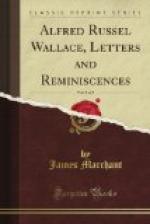His life was a happy one, and even the discomforts caused by his ailments, which were at times very acute for days together, never prevented him from enjoying the contemplation of his flowers, nor disturbed the serenity of his temper, nor caused him to complain.
Although rather delicate all his life, he rarely stayed in bed; in fact, only once in our memory, during an illness at Parkstone, did he do so, and then only for one day.
On Saturday, November 1st (1913), he walked round the garden, and on the following day seemed very bright, and enjoyed his dinner and supper, but about nine o’clock he felt faint and shivered violently. We called in Dr. Norman, who came in about an hour, and we heard them having a long talk and even laughing, in the study. As the doctor left he said, “Wonderful man! he knows so much. I can do nothing for him.”
The next day he did not get up at the usual time, but we felt no anxiety until noon, when he still showed no inclination to rise. He appeared to be dozing, and said he wanted nothing. From that time he gradually sank into semi-consciousness, and at half-past nine in the morning of Friday, November 7th, quietly passed on to that other life in which he was such a firm believer.
PART V
Social and Political Views
“When a country is well
governed, poverty and a mean condition are
things to be ashamed of.
When a country is ill governed, riches
and honour are things to be
ashamed of.”—CONFUCIUS.
In the above sentences, written long before the dawn of Christian civilisation, we have an apt summary of the social and political views of Alfred Russel Wallace.
As we have stated in a previous chapter, it was during his short stay in London as a boy, when he was led to study the writings and methods of Robert Owen, of New Lanark, that his mind first opened to the consideration of the inequalities of our social life.
During the six years which he spent in land-surveying he obtained a more practical knowledge of the laws pertaining to public and private property as they affected the lives and habits of both squire and peasant.
The village inn, or public-house, was then the only place where men could meet to discuss topics of mutual interest, and it was there that young Wallace and his brother spent some of their own leisure hours listening to and conversing with the village rustics. The conversation was not ordinarily of an educational character, but occasionally experienced farmers would discuss agricultural and land problems which were beginning to interest Wallace.




